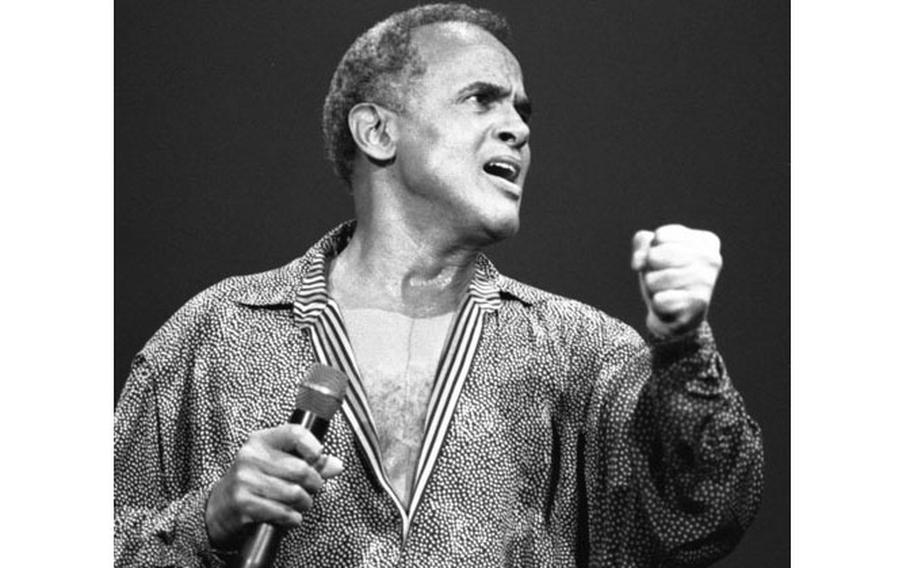
Harry Belafonte, in concert at the Festhalle in Frankfurt, Germany, in October, 1988. (Michael Abrams/Stars and Stripes)
IT MAY WELL go down in Frankfurt’s musical history as the night the 50-and-over crowd rushed the stage and wouldn’t take “no” for an answer. After a two-hour concert and an encore of We Are the World, Harry Belafonte smiled his good-nights and left the Festhalle stage, probably thinking it was high time for post-show relaxation and Chinese food.
But noooooooo.
The lights went on in the arena, a sure sign that everyone is supposed to give up and go home. The crowd of well-dressed bankers and dowagers wasn’t buying it. Instead, they worked even harder to convince Belafonte to return to the stage, loudly clapping, stomping and yelling.
Their efforts paid off. After 15 minutes, the 61-year-old singer, his backup singers and band returned to the stage in their street clothes and performed a trio of songs. Only then did the audience call it quits. THAT’S power.
But seriously, Belafonte earned his money that evening — his first concert in the West German city in more than five years — as a lively tour guide on a musical escapade around the world:

Harry Belafonte, in concert at the Festhalle in Frankfurt, Germany, in October 1988. (Michael Abrams/Stars and Stripes)
Hopping from country to country and switching musical styles from calypso to South African rhythms and more, a Belafonte concert is like a singalong through a UNICEF songbook: Here’s a song from Haiti. One from Israel. Two from Jamaica. And here’s a song about kids everywhere.
Although older hits like The Banana Boat Song (most know it as Day-o), Mathilda and All Day, All Night, Mary Anne wrung the most vigorous audience response, newer material like the romantic ballad Skin to Skin from his current album, Paradise in Gazankulu, also played well.

Harry Belafonte, in concert at the Festhalle in Frankfurt, Germany, in October 1988. (Michael Abrams/Stars and Stripes)
Skin to Skin played so well, in fact, that Belafonte (in a riveting duet with singer Sharon Brooks) did it twice in a row, the first of three songs he would repeat during his concert.
Hearing the same song performed twice and in exactly the same way both times during one concert is a letdown, particularly when the first time evoked great pleasure. (Sometimes, if it’s a lousy song, it can get better on a second hearing.) It bursts the magic that surrounds a special song, a song one feels could only have been performed as wonderfully once.

Harry Belafonte, in concert at the Festhalle in Frankfurt, Germany, in October 1988. (Michael Abrams/Stars and Stripes)
To his credit, Belafonte can be proud of the diversity of influences he features in his musical selections and the facility he demonstrates under each new style. A modern folk singer who specializes in giving a musical voice to Third World nations, he entertains brightly without preaching and offers a well-thought out evening of music, humorous patter and empathy for his fellow man.
But please, Harry, learn a few more songs.

Harry Belafonte, in concert at the Festhalle in Frankfurt, Germany, in October 1988. (Michael Abrams/Stars and Stripes)